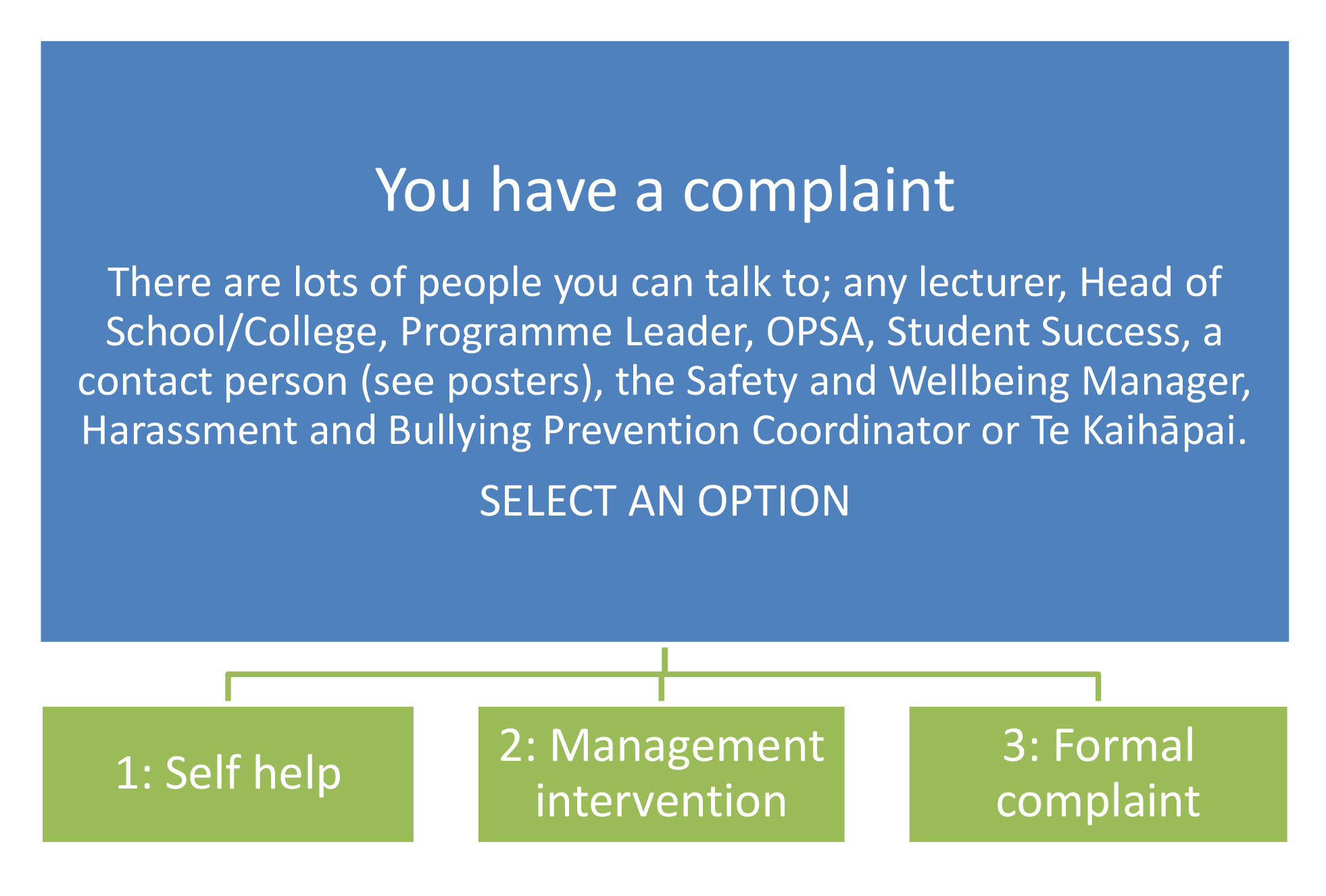Bullying
Harassment and bullying can make life stressful and unpleasant. You have the right to study in a harassment and bullying free environment.
What is bullying and harassment?
Otago Polytechnic is committed to providing a safe working and learning environment in which all staff and students are treated with respect and dignity.
Harassment is conduct which is unwelcome or offensive to the recipient in relation to their race, colour, ethnic or national origins, gender, gender identity, age, disability, physical appearance, marital or family status, religion, ethical belief, union participation/non/participation, political opinion or sexual orientation.
Bullying is unwelcome and unreasonable behaviour which includes victimisation, humiliation, undermining or threatening behaviours and may involve the actions of an individual or a group. It creates an uncomfortable or hostile environment for those who are a target of the bullying.
Harassment and Bullying can be:
-
One serious incident
-
Or behaviour that is persistently unwelcome and offensive, to the extent that it has a detrimental effect on learning, performance or wellbeing.
"Speak up and help stop bullying"

(1)
-
Verbal behaviour
Saying things to or about a person, or talking within the hearing of others about subjects that may be offensive, shouting, mimicking, etc.
-
Visual behaviour
Writing, drawing, posters, txt, pxt, posting and downloading or displaying offensive materials (eg: social media, blogs, wikis).
-
Physical behaviour
Inappropriate touching, gestures, invading personal space, being overbearing, excluding a person from a group.
Examples of harassment and bullying:
-
Displaying sexual or sexist material
-
Calling you a nickname you don’t like
-
Belittling your religious or cultural beliefs
-
Looking at you in a way that makes you feel uncomfortable
-
Invading your personal space
-
Making racist or sexist jokes or comments
-
Mimicking your accent, stutter or mannerism
-
Spreading rumours
-
Playing ill-natured practical joke
-
Swearing at you or using abusive language
-
Excluding, isolating or ignoring you
-
Cyber bullying; including inappropriate comments, pictures and videos on Facebook, twitter and other social media pages.
Who harasses or bullies?
Harassment or bullying may occur in the behaviour of one or more staff members, students or any other person with whom you come in contact as part of your course of study.
"You may be harassed or bullied if you feel unhappy or uncomfortable about someone."
Dealing with bullying
Who to talk to if you are harassed or bullied?
These people can assist you with discussing a concern or making a complaint:
-
Student Success team
-
Any teacher
-
Your Head of School/College or Programme Manager/Leader
-
OPSA
-
Your hall supervisor or residential assistant
-
The Safety and Wellbeing Manager
-
Harassment and Bullying Prevention Coordinator
-
Chaplain
-
Upstanders - Trained contact people
Upstanders - Trained contact people
If you prefer, you can talk to an Upstander. He or she will listen to your problem and give you information about the Polytechnic’s concerns/complaints procedure. All discussions with an Upstander are confidential.
However, if your concern is so serious that you or other people are at risk, the Upstander may discuss the matter with the Harassment and Bullying Prevention Co-ordinator to make sure you are protected.
Dealing with the issue - your options
You have three options in dealing with a harassment or bullying concern:
Self Help
If you feel you are being harassed or bullied by another person, you can talk with them and say:
-
What the person is doing
-
How it makes you feel
-
That you want the offensive behaviour to stop.
If the person does not stop, or harasses or bullies you in another way, you should seek help right away.
Intervention
You may prefer to have someone else speak to the person causing you concern on your behalf. Intervention might be conducted by a Head of School/College, Deputy CEO, or the Harassment and Bullying Prevention Coordinator. This person will assess your complaint and decide whether it is appropriate to intervene. With help, agreement may be reached between you and the alleged harasser or bully about future behaviour.
Formal Complaint
If the situation concerning you is serious, you should make a formal complaint.
Any of the people beforehand can assist you to do this. If appropriate, your allegations will be investigated – and you, the alleged harasser or bully and possibly other people who may have knowledge of the issues involved will be interviewed. The Chief Executive Officer will make a final decision on your complaint, and if your complaint is found to have substance, the harasser or bully may receive a penalty.

Cyber bullying
Bullying in any form is unacceptable.
The common element of cyber bullying is the use of technology like the internet and cell phones to harass a victim.
The Cyber bullying Research Center defines it as, “willful and repeated harm inflicted through the use of computers, cellphones, and other electronic devices.”
Cyber bullying could be:
-
Name-calling via social media
-
Threatening text messages
-
Unauthorized posting of personal pictures or videos
In cyberbullying the bully is protected by the anonymity of the Internet and the effects on the victim are magnified because more peers can see the bullying, and it's difficult if not impossible to erase its record. If you are a victim of cyber bullying there are some strategies you can use to help you stay strong.
How can I protect myself?
Taking some smart precautions can help you avoid cyberbullying.

Never forget that the internet is public. (2)
Protect yourself interactive list
Investigate what measures you can take to keep content private on the websites you use.
On most social networking sites you can adjust your settings so that only the people you select are able to see your personal information and posts. It’s important to check these privacy settings frequently, because sites sometimes change their policies.
Never forget that the internet is public. What you put out there can never be erased. If you wouldn’t say something in a room full of strangers, don’t say it via internet. Even letting someone know sensitive or embarrassing information about you via email can have unforeseen consequences.
Don’t reveal identifying details about yourself — address, phone number, school, credit card number, etc.
Passwords exist for a reason; sharing them with friends is like passing out copies of your house key to friends and strangers alike.
What can I do if I am a victim?
Being cyberbullyied can make you feel helpless, but there are steps you can take to look after yourself and seek help. The most important thing to do is to talk to a person you trust as soon as you realise there is a problem.
How can I react to cyberbullying?
Sometimes bullies are encouraged by seeing a reaction.
Do not respond to minor teasing or name calling if you can avoid it.
Keep a record of bullying messages you receive in hard copy. It may be helpful so to verify what went on and who the bully is.
There is no reason to suffer alone when you are the target of bullying. Ask for help. Contact Student Success or Netsafe.org.nz
Stop all communication with the bully when possible. You may be able to block their phone number so you no longer receive their calls or texts.
If that’s not possible, you might consider changing phone numbers. Facebook and instant messenger providers allow you to block other users so that they can no longer interact with you.
If for some reason it’s not possible to block a cyberbully, you can always screen their calls and delete their messages without opening them.
If you’re being bullied via a website, chances are that the bully is going against the website’s terms of use. Reporting bullies to the website administrator may get them kicked off the site. On Facebook and Youtube, some of the most popular sites for cyberbullying activity, you can report cyberbullying incidents to the sites’ “safety centers.”
You can get in touch with your internet service provider, cell phone service provider, or content provider. In some cases, they can look into the bullying incident to uncover an anonymous bully and may also be able to take down offensive posts.
What shouldn't I do?
-
Don’t sink to the bully’s level. Starting your own cyberbullying campaign against the bully will get you nowhere, especially if you end up breaking laws or Otago Polythecnic rules.
-
Don’t forward bullying content or messages. If someone sends you a bullying message, forwarding it to a friend only expands the problem. You never know how far an email chain can go.
-
Don’t believe the bully. Don’t let bullies destroy your self-esteem. No one deserves to be harassed. Cyberbullies’ cowardly and destructive actions are often more about their own problems than they are about you. When bullying gets you down, talk about it with someone you trust who can build you back up.
Treating others with respect
Otago Polytechnic wishes to provide a learning environment in which harassment and bullying is unlikely to occur. This means that you must not act in ways inconsistent with our harassment and bullying prevention policy.
THINK About it
While you can never predict exactly what kind of behaviour will offend someone, you can be sensible. Think about the people you work and study with. What sort of jokes, comments and behaviour do you think they find acceptable? Do you treat others in the way you wish yourself or your friends to be treated?
TALK About Harassment and Bullying
The ideal way for harassment issues to be resolved is for people to talk about them. If you are approached by a fellow student about your behaviour:
Listen to what he or she has to say. Respect that person’s right not to be offended and change your behaviour. If you didn’t mean to offend, you can apologise and not repeat the behaviour. Although it may be embarrassing for someone to say your actions are offensive, it is important to be able to talk about harassment and bullying.
Remember
Some people who feel harassed or bullied in the Polytechnic may not have the confidence to approach the person who is disrespecting them, and may seek intervention. If you are approached by a staff member on another person’s behalf, view it as an opportunity for discussion. Most complainants do not want to get the person concerning them in trouble, they simply want the offensive behaviour to stop.

Think, talk and remember.
Don’t stand by
If you see another student being harassed or bullied don’t stand by. Talk to the person about how he or she feels and/or tell a staff member. The person may be uncomfortable about seeking assistance, but they are likely to welcome your support.
Otago Polytechnic treats harassment and bullying issues very seriously. Treat others with respect at all times. You have a right to study in a respectful and safe environment.
“Bullying is everyone’s responsibility"
Attributions
(1) Why does David have his head in his hands? Phil Rogers. Image retrieved from: https://www.flickr.com/photos/erase/6710590169 Licensed under Creative Commons Attribution-NonCommercial 2.0 Generic
(2) Texting mobile phones. Dean Moriarty. Image retrieved from https://pixabay.com/photos/texting-mobile-phones-hands-two-1490691/ Licensed under a Pixabay License.
Texting. Jan Vasek. Image retrieved from https://pixabay.com/photos/mobile-hand-nokia-lumia-man-young-722946/ Licensed under a Pixabay License.


